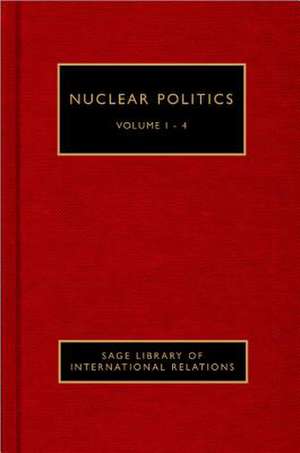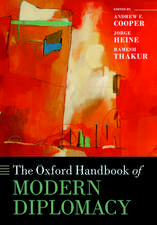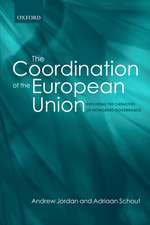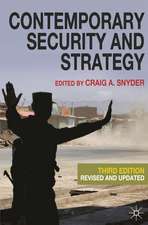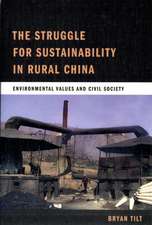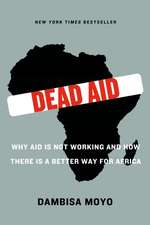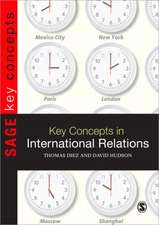Nuclear Politics: SAGE Library of International Relations
Editat de Maria Rost Rublee, Ramesh Thakuren Limba Engleză Hardback – 18 feb 2014
This new four-volume Major Work explores this important issue and aims to introduce readers to the key arguments and authors in the field. With such a wide variety of theoretical approaches and substantive topics under the umbrella of nuclear politics, this collection will not only allow the reader to peruse the diverse explanations for the regime, proliferation, nonproliferation and disarmament, it will also guide them through the intellectual history of the field.
Volume One: The Nuclear Nonproliferation Regime
Volume Two: Nuclear Proliferation
Volume Three: Nuclear Nonproliferation
Volume Four: Nuclear Disarmament and Alternative Voices on Nuclear Issues
Din seria SAGE Library of International Relations
- 14%
 Preț: 5403.97 lei
Preț: 5403.97 lei - 9%
 Preț: 6350.80 lei
Preț: 6350.80 lei - 26%
 Preț: 5094.64 lei
Preț: 5094.64 lei - 26%
 Preț: 4936.48 lei
Preț: 4936.48 lei - 26%
 Preț: 6807.70 lei
Preț: 6807.70 lei - 26%
 Preț: 5826.51 lei
Preț: 5826.51 lei - 11%
 Preț: 4551.41 lei
Preț: 4551.41 lei - 26%
 Preț: 4939.53 lei
Preț: 4939.53 lei - 16%
 Preț: 5259.50 lei
Preț: 5259.50 lei - 16%
 Preț: 5252.14 lei
Preț: 5252.14 lei - 26%
 Preț: 4940.12 lei
Preț: 4940.12 lei - 16%
 Preț: 3906.67 lei
Preț: 3906.67 lei - 16%
 Preț: 5251.65 lei
Preț: 5251.65 lei - 16%
 Preț: 5251.10 lei
Preț: 5251.10 lei - 11%
 Preț: 5253.08 lei
Preț: 5253.08 lei - 11%
 Preț: 5252.10 lei
Preț: 5252.10 lei - 11%
 Preț: 7247.29 lei
Preț: 7247.29 lei - 11%
 Preț: 5253.31 lei
Preț: 5253.31 lei - 26%
 Preț: 4940.04 lei
Preț: 4940.04 lei - 26%
 Preț: 4942.07 lei
Preț: 4942.07 lei - 26%
 Preț: 4941.65 lei
Preț: 4941.65 lei - 11%
 Preț: 5253.21 lei
Preț: 5253.21 lei - 11%
 Preț: 4547.40 lei
Preț: 4547.40 lei - 16%
 Preț: 5513.72 lei
Preț: 5513.72 lei - 26%
 Preț: 5188.93 lei
Preț: 5188.93 lei - 26%
 Preț: 5442.37 lei
Preț: 5442.37 lei - 11%
 Preț: 5513.61 lei
Preț: 5513.61 lei - 26%
 Preț: 5190.05 lei
Preț: 5190.05 lei - 26%
 Preț: 9215.99 lei
Preț: 9215.99 lei - 26%
 Preț: 8804.00 lei
Preț: 8804.00 lei - 26%
 Preț: 5092.82 lei
Preț: 5092.82 lei - 26%
 Preț: 5094.83 lei
Preț: 5094.83 lei
Preț: 5444.43 lei
Preț vechi: 7357.34 lei
-26% Nou
Puncte Express: 8167
Preț estimativ în valută:
1041.93€ • 1076.36$ • 867.14£
1041.93€ • 1076.36$ • 867.14£
Carte tipărită la comandă
Livrare economică 25 martie-08 aprilie
Preluare comenzi: 021 569.72.76
Specificații
ISBN-13: 9781446282137
ISBN-10: 1446282139
Pagini: 1664
Dimensiuni: 156 x 234 x 130 mm
Greutate: 3.13 kg
Ediția:Four-Volume Set
Editura: SAGE Publications
Colecția Sage Publications Ltd
Seria SAGE Library of International Relations
Locul publicării:London, United Kingdom
ISBN-10: 1446282139
Pagini: 1664
Dimensiuni: 156 x 234 x 130 mm
Greutate: 3.13 kg
Ediția:Four-Volume Set
Editura: SAGE Publications
Colecția Sage Publications Ltd
Seria SAGE Library of International Relations
Locul publicării:London, United Kingdom
Recenzii
An estimated 18,000 nuclear warheads exist in the arsenals of nine nuclear weapon armed countries - more than 5,000 of them deployed and nearly 2,000 on a state of alert ready to be launched in minutes. This frightening scenario of the actual potential for the use of the most destructive weapon of mass destruction invented by humankind with its long-term genetic and ecological impact demands that we examine the rationale for these weapons. The availability of a reader with some of the best intellectual work on the subject in this 4 volume publication edited by Professors Maria Rost Rublee and Ramesh Thakur is a an outstanding service to students and the general public as we move towards the elimination of nuclear weapons.
The Cold War created an appropriate acronym to describe nuclear insanity: MAD (Mutually Assured Destruction). What is truly mad now is that this nuclear insanity continues when the Cold War rationale for it has disappeared. If we want to move beyond MAD and Cold-War nuclear thinking, a comprehensive understanding of nuclear politics is critical. This four-volume reference work not only provides that broad overview, but also notably includes literature on disarmament and alternative voices on nuclear issues
The Cold War created an appropriate acronym to describe nuclear insanity: MAD (Mutually Assured Destruction). What is truly mad now is that this nuclear insanity continues when the Cold War rationale for it has disappeared. If we want to move beyond MAD and Cold-War nuclear thinking, a comprehensive understanding of nuclear politics is critical. This four-volume reference work not only provides that broad overview, but also notably includes literature on disarmament and alternative voices on nuclear issues
Cuprins
VOLUME ONE: THE NUCLEAR NONPROLIFERATION REGIME
Nuclear Learning and U.S.-Soviet Security Regimes - Joseph Nye
The Realist Nuclear Regime - Zachary Davis
The Nuclear Nonproliferation Treaty: History and Current Problems - George Bunn
Taking Stock of the Nuclear Nonproliferation Regime: Using Social Psychology to Understand Regime Effectiveness - Maria Rost Rublee
The Puzzle of Trusting Relationships in the Nuclear Non-Proliferation Treaty - Jan Ruzicka and Nicholas Wheeler
Nuclear Nonproliferation and Disarmament: Can the Power of Ideas Tame the Power of the State? - Ramesh Thakur
The Ambivalence of Nuclear Histories - Itty Abraham
Nuclear Weapons, International Law and the World Court: A Historic Encounter - Richard Falk
The Comprehensive Test-Ban Treaty’s Relevance to Global Security - Nancy Gallagher
Stepping Stones to a Nuclear-Weapons-Free World - Ramesh Thakur
Peeling the Orange: Regional Paths to a Nuclear-Weapon-Free World - Michael Hamel-Green
International Humanitarian Law and Nuclear Weapons: Irreconcilable Differences - Dean Granoff and Jonathan Granoff
Spreading Temptation: Proliferation and Peaceful Nuclear Cooperation Agreements - Matthew Fuhrmann
Importing the Bomb: Sensitive Nuclear Assistance and Nuclear Proliferation - Matthew Kroenig
Nuclear Power Without Nuclear Proliferation? - Steven Miller and Scott Sagan
Proliferation Rings: New Challenges to the Nuclear Nonproliferation Regime - Chaim Braun and Christopher Chyba
Multilateral Cooperation and the Prevention of Nuclear Terrorism: Pragmatism Over Idealism - Wyn Bowen, Matthew Cottee and Christopher Hobbs
A Security System Commensurate with the Risk of Nuclear Terrorism - Kenneth Brill and Kenneth Luongo
Engaging India, Israel and Pakistan in the Nuclear Non-proliferation Regime - Jenny Nielsen
Can the NPT Regime Be Fixed or Should It Be Abandoned? - Ramesh Thakur, Jane Boulden, and Thomas Weiss
VOLUME TWO: NUCLEAR PROLIFERATION
The Brooding Shadow: Systemic Incentives and Nuclear Weapons Proliferation - Benjamin Frankel
Why Nuclear Superiority Doesn’t Matter - Robert Jervis
Exploding the Black Box: The Historical Sociology of Nuclear Proliferation - Steven Flank
Why Do States Build Nuclear Weapons? - Scott Sagan
Is There A Theory of Nuclear Proliferation? An Analysis of the Contemporary Debate - Tanya Ogilvie-White
The Nuclear Taboo: The United States and the Normative Basis of Nuclear Non-Use - Nina Tannenwald
Taboo or Tradition: The Non-Use of Nuclear Weapons in World Politics - T.V. Paul
Nuclear Myths and Political Realities - Kenneth Waltz
The Perils of Proliferation: Organization Theory, Deterrence Theory, and the Spread of Nuclear Weapons - Scott Sagan
The Myth of Nuclear Deterrence - Ward Wilson
Bringing Israel’s Bomb Out of the Basement: Has Nuclear Ambiguity Outlived Its Shelf Life - Avner Cohen and Marvin Miller
The South Asian Nuclear Challenge - Ramesh Thakur
India's Pathway to Pokhran II: The Prospects and Sources of New Delhi's Nuclear Weapons Program - Sumit Ganguly
Pakistan's Nuclear Weapons Program: Turning Points and Nuclear Choices - Samina Ahmed
North Korea’s Weapons of Mass Destruction: Badges, Shields, or Swords? - Victor Cha
Nuclear Proliferation and Regional Security Orders: Comparing North Korea and Iran - Amitav Acharya
The Correlates of Nuclear Proliferation: A Quantitative Test - Sonali Singh and Christopher Way
The Perils of Predicting Proliferation - Alexander Montgomery and Scott Sagan
VOLUME THREE: NUCLEAR NONPROLIFERATION
The Political Psychology of the Nuclear Nonproliferation Regime - Glenn Chafetz
Constructivism and Social Psychology in Peace Studies: Understanding Nuclear Nonproliferation and Disarmament in East Asia - Maria Rost Rublee
Domestic Sources of Preferences for Arms Cooperation: The Impact of Protest - Jeffrey Knopf
The Political Economy of Nuclear Restraint - Etel Solingen
Never Say Never Again: Nuclear Reversal Revisited - Ariel Levite
Botching the Bomb: Why Nuclear Weapons Programs Often Fail on Their Own – and Why Iran’s Might, Too - Jacques Hymans
Of Gauchos and Gringos: Why Argentina Never Wanted the Bomb, and Why the United States Thought It Did - Jacques Hymans
Civil-Military Affairs and Security Institutions in the Southern Cone: The Sources of Argentine-Brazilian Nuclear Cooperation - Arturo Velázquez
Egypt's Nuclear Weapons Program: Lessons Learned - Maria Rost Rublee
German National Identity and WMD Proliferation - Harald Müller
Lessons of UNSCOM and UNMOVIC for WMD Non-Proliferation, Arms Control and Disarmament - Trevor Findlay
The Soviet Union and Nuclear Proliferation - William Potter
Nuclear U-Turns: Learning from South Korean and Taiwanese Rollback - Rebecca Hersman and Robert Peters
Non-Proliferation and Counter-Terrorism Cooperation in Southeast Asia: Meeting Global Obligations Through Regional Security Architectures? - Tanya Ogilvie-White
Libya's Nuclear Turnaround: Perspectives from Tripoli - Målfrid Braut-Hegghammer
Tito’s Nuclear Legacy - William Potter, Djuro Miljanic and Ivo Slaus
Discursive Foundations of Iran's Nuclear Policy - Homeira Moshirzadeh
VOLUME FOUR: NUCLEAR DISARMAMENT AND ALTERNATIVE VOICES ON NUCLEAR ISSUES
Is Nuclear Zero the Best Option? - Scott Sagan and Kenneth Waltz
What’s Next? - George Perkovich and James Acton
Abolishing Nuclear Armouries: Policy or Pipedream? - Michael Quinlan
Verification and Security in a Nuclear-Weapon-Free World: Elements and Framework of a Nuclear Weapons Convention - Jürgen Scheffran
North Korea Test as Spur to Nuclear Disarmament - Ramesh Thakur
If You Want Nonproliferation, Prepare for Disarmament - Ramesh Thakur
Ideas, Beliefs, and Nuclear Policies: The Cases of South Africa and Ukraine - William Long and Suzette Grillot
The Nuclear Threshold States: Nuclear Disarmament and the Challenges and Opportunities Posed by Brazil and Japan - Maria Rost Rublee
Regulating the Possession and Use of Nuclear Weapons: Ideas, Commissions and Agency in International Security Politics - Marianne Hanson
Tacit Knowledge, Weapons Design, and the Uninvention of Nuclear Weapons - Donald MacKenzie and Graham Spinardi
Putting Disarmament Back in the Frame - Neil Cooper
Nuclearism, Human Rights and Constructions of Security (Part 1) - Ken Booth
Nuclear Reason: At the Limits of Strategy - Anthony Burke
Sex and Death in the Rational World of Defense Intellectuals - Carol Cohn
Gender and the Nuclear Weapons State: A Feminist Critique of the UK Government’s White Paper on Trident - Claire Duncanson and Catherine Eschle
Reconstituting Security? : The Practices of Proliferation Control - David Mutimer
Relinquishing Nuclear Weapons: Identities, Networks and the British Bomb - Nick Ritchie
Reviving Nuclear Ethics: A Renewed Research Agenda for the Twenty-First Century - Thomas Doyle
Nuclear Learning and U.S.-Soviet Security Regimes - Joseph Nye
The Realist Nuclear Regime - Zachary Davis
The Nuclear Nonproliferation Treaty: History and Current Problems - George Bunn
Taking Stock of the Nuclear Nonproliferation Regime: Using Social Psychology to Understand Regime Effectiveness - Maria Rost Rublee
The Puzzle of Trusting Relationships in the Nuclear Non-Proliferation Treaty - Jan Ruzicka and Nicholas Wheeler
Nuclear Nonproliferation and Disarmament: Can the Power of Ideas Tame the Power of the State? - Ramesh Thakur
The Ambivalence of Nuclear Histories - Itty Abraham
Nuclear Weapons, International Law and the World Court: A Historic Encounter - Richard Falk
The Comprehensive Test-Ban Treaty’s Relevance to Global Security - Nancy Gallagher
Stepping Stones to a Nuclear-Weapons-Free World - Ramesh Thakur
Peeling the Orange: Regional Paths to a Nuclear-Weapon-Free World - Michael Hamel-Green
International Humanitarian Law and Nuclear Weapons: Irreconcilable Differences - Dean Granoff and Jonathan Granoff
Spreading Temptation: Proliferation and Peaceful Nuclear Cooperation Agreements - Matthew Fuhrmann
Importing the Bomb: Sensitive Nuclear Assistance and Nuclear Proliferation - Matthew Kroenig
Nuclear Power Without Nuclear Proliferation? - Steven Miller and Scott Sagan
Proliferation Rings: New Challenges to the Nuclear Nonproliferation Regime - Chaim Braun and Christopher Chyba
Multilateral Cooperation and the Prevention of Nuclear Terrorism: Pragmatism Over Idealism - Wyn Bowen, Matthew Cottee and Christopher Hobbs
A Security System Commensurate with the Risk of Nuclear Terrorism - Kenneth Brill and Kenneth Luongo
Engaging India, Israel and Pakistan in the Nuclear Non-proliferation Regime - Jenny Nielsen
Can the NPT Regime Be Fixed or Should It Be Abandoned? - Ramesh Thakur, Jane Boulden, and Thomas Weiss
VOLUME TWO: NUCLEAR PROLIFERATION
The Brooding Shadow: Systemic Incentives and Nuclear Weapons Proliferation - Benjamin Frankel
Why Nuclear Superiority Doesn’t Matter - Robert Jervis
Exploding the Black Box: The Historical Sociology of Nuclear Proliferation - Steven Flank
Why Do States Build Nuclear Weapons? - Scott Sagan
Is There A Theory of Nuclear Proliferation? An Analysis of the Contemporary Debate - Tanya Ogilvie-White
The Nuclear Taboo: The United States and the Normative Basis of Nuclear Non-Use - Nina Tannenwald
Taboo or Tradition: The Non-Use of Nuclear Weapons in World Politics - T.V. Paul
Nuclear Myths and Political Realities - Kenneth Waltz
The Perils of Proliferation: Organization Theory, Deterrence Theory, and the Spread of Nuclear Weapons - Scott Sagan
The Myth of Nuclear Deterrence - Ward Wilson
Bringing Israel’s Bomb Out of the Basement: Has Nuclear Ambiguity Outlived Its Shelf Life - Avner Cohen and Marvin Miller
The South Asian Nuclear Challenge - Ramesh Thakur
India's Pathway to Pokhran II: The Prospects and Sources of New Delhi's Nuclear Weapons Program - Sumit Ganguly
Pakistan's Nuclear Weapons Program: Turning Points and Nuclear Choices - Samina Ahmed
North Korea’s Weapons of Mass Destruction: Badges, Shields, or Swords? - Victor Cha
Nuclear Proliferation and Regional Security Orders: Comparing North Korea and Iran - Amitav Acharya
The Correlates of Nuclear Proliferation: A Quantitative Test - Sonali Singh and Christopher Way
The Perils of Predicting Proliferation - Alexander Montgomery and Scott Sagan
VOLUME THREE: NUCLEAR NONPROLIFERATION
The Political Psychology of the Nuclear Nonproliferation Regime - Glenn Chafetz
Constructivism and Social Psychology in Peace Studies: Understanding Nuclear Nonproliferation and Disarmament in East Asia - Maria Rost Rublee
Domestic Sources of Preferences for Arms Cooperation: The Impact of Protest - Jeffrey Knopf
The Political Economy of Nuclear Restraint - Etel Solingen
Never Say Never Again: Nuclear Reversal Revisited - Ariel Levite
Botching the Bomb: Why Nuclear Weapons Programs Often Fail on Their Own – and Why Iran’s Might, Too - Jacques Hymans
Of Gauchos and Gringos: Why Argentina Never Wanted the Bomb, and Why the United States Thought It Did - Jacques Hymans
Civil-Military Affairs and Security Institutions in the Southern Cone: The Sources of Argentine-Brazilian Nuclear Cooperation - Arturo Velázquez
Egypt's Nuclear Weapons Program: Lessons Learned - Maria Rost Rublee
German National Identity and WMD Proliferation - Harald Müller
Lessons of UNSCOM and UNMOVIC for WMD Non-Proliferation, Arms Control and Disarmament - Trevor Findlay
The Soviet Union and Nuclear Proliferation - William Potter
Nuclear U-Turns: Learning from South Korean and Taiwanese Rollback - Rebecca Hersman and Robert Peters
Non-Proliferation and Counter-Terrorism Cooperation in Southeast Asia: Meeting Global Obligations Through Regional Security Architectures? - Tanya Ogilvie-White
Libya's Nuclear Turnaround: Perspectives from Tripoli - Målfrid Braut-Hegghammer
Tito’s Nuclear Legacy - William Potter, Djuro Miljanic and Ivo Slaus
Discursive Foundations of Iran's Nuclear Policy - Homeira Moshirzadeh
VOLUME FOUR: NUCLEAR DISARMAMENT AND ALTERNATIVE VOICES ON NUCLEAR ISSUES
Is Nuclear Zero the Best Option? - Scott Sagan and Kenneth Waltz
What’s Next? - George Perkovich and James Acton
Abolishing Nuclear Armouries: Policy or Pipedream? - Michael Quinlan
Verification and Security in a Nuclear-Weapon-Free World: Elements and Framework of a Nuclear Weapons Convention - Jürgen Scheffran
North Korea Test as Spur to Nuclear Disarmament - Ramesh Thakur
If You Want Nonproliferation, Prepare for Disarmament - Ramesh Thakur
Ideas, Beliefs, and Nuclear Policies: The Cases of South Africa and Ukraine - William Long and Suzette Grillot
The Nuclear Threshold States: Nuclear Disarmament and the Challenges and Opportunities Posed by Brazil and Japan - Maria Rost Rublee
Regulating the Possession and Use of Nuclear Weapons: Ideas, Commissions and Agency in International Security Politics - Marianne Hanson
Tacit Knowledge, Weapons Design, and the Uninvention of Nuclear Weapons - Donald MacKenzie and Graham Spinardi
Putting Disarmament Back in the Frame - Neil Cooper
Nuclearism, Human Rights and Constructions of Security (Part 1) - Ken Booth
Nuclear Reason: At the Limits of Strategy - Anthony Burke
Sex and Death in the Rational World of Defense Intellectuals - Carol Cohn
Gender and the Nuclear Weapons State: A Feminist Critique of the UK Government’s White Paper on Trident - Claire Duncanson and Catherine Eschle
Reconstituting Security? : The Practices of Proliferation Control - David Mutimer
Relinquishing Nuclear Weapons: Identities, Networks and the British Bomb - Nick Ritchie
Reviving Nuclear Ethics: A Renewed Research Agenda for the Twenty-First Century - Thomas Doyle
Descriere
With such a wide variety of theoretical approaches and substantive topics under the umbrella of nuclear politics, this collection will not only allow the reader to peruse the diverse explanations for the regime, proliferation, non-proliferation and disarmament, it will also guide them through the intellectual history of the field.
